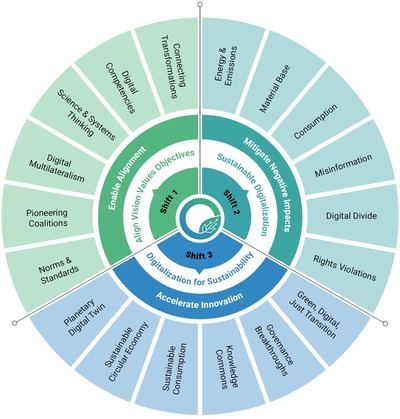Critical Reflections on a Global Sociotechnical Imagination of Digital Sustainability
The case of the United Nations “Action Plan for a Sustainable Planet in the Digital Age”
06.06.2023
By: Nils Egger
Supervisor: Dr. Gesa Lüdecke
The "Action Plan for a Sustainable Planet in the Digital Age” by the United Nations “Coalition for Digital Environmental Sustainability" (CODES) is a roadmap and vision to advance digital sustainability – meaning sustainable digitalization as well as furthering sustainability in other areas through digitalization. The report was developed in a multi-stakeholder process involving various international and national institutions from all around the world from 2021 to 2022. In my final project I critically analyzed this report and presented my findings at the Bits&Bäume conference 2023 in Münster, North Rhine-Westphalia. Bits&Bäume is the leading social movement combining digitalization and sustainability in Germany. It was founded in 2018 by several NGOs working on internet-, environmental- and development policy but now includes not only NGOs, but actors from academia, business, public administration as wells as from other social movements. The goal of my project was to bring this action plan to the attention of the German community around digitalization and sustainability while critically reflecting on the reports' premises and conclusions.

The three shifts and 18 strategic priorities that according to the action plan are needed to achieve a sustainable planet in the digital age. (Picture: Coalition for Digital Environmental Sustainability (CODES). Action Plan for a Sustainable Planet in the Digital Age, 2022: p. 5. https://doi.org/10.5281/zenodo.6573509)
My presented analysis consisted of six key points:
1. The report doesn’t sufficiently talk about reducing energy consumption, emissions and the material basis of digital technologies in absolute terms. A stronger focus on sufficiency rather than mostly on consistency and efficiency is needed.
2. While implementing a “circular economy” and adding social and environmental parameters to business models and growth accounting from institutions in a “beyond growth” paradigm are seen as cornerstones of innovations to a digitalized sustainability, the report doesn’t fundamentally discuss the problem of economic growth being a functional prerequisite of the current global system and possible pathways out of this.
3. Problems around human and workers’ rights in different sectors of the digital economy supply chain are treated too lightly. While problems in the extraction of materials are noted, there is no word about problems in the secondary or tertiary sector like sweatshop conditions in production facilities of digital consumer technology or mentally devastating work in outsourced content moderation work of social media platforms.
4. The developing process of the report tried to map problems and solutions through a bottom-up process of stakeholder participation but built strongly on the cooperation with international and national state institutions. The report doesn’t make clear how they actively tried to ensure to include marginalized groups that do not have access to official institutions or the resources to organize involvement themselves.
5. There is no section in the report talking about the limits of (digital) technology or dangers of hype dynamics around newer (digital) technologies for sustainable development. Regarding the hype around large language models since early 2023 for examples, an expert assessment of such dynamics is strongly needed.
6. Finally, there is no systematic reference to the sustainable development goals (SDGs) of the United Nations, although they are mentioned in the motivation for this “Action Plan”. Systematic references between the SDGs and the reports strategies could be highly useful for practitioners already working with the SDGs and could ensure a more consistent transformational vision.
Besides all these critical points, the "Action Plan for a Sustainable Planet in a Digital World" is a good start for a global vision to bring the digital and the sustainable transformations of our time together. It can also be a tool for practitioners to align their projects involving digital technology with sustainability goals and discover some possible blind spots with it. The report can for now serve as a lowest common denominator for the digitalization and sustainability nexus (similar to the SDGs for sustainable development in general), while critically working on its further development and improvement. Being part of a bigger consultation process for the UN "Global Digital Compact" deliberations in September of 2024, it will be interesting to see how the action plan will shape the compact and, if the compact may even picks up on some of the critical points mentioned above. In the end, further research and active engagement from all types of stakeholders is need so that digital environmental sustainability is not just some sort of high-tech greenwashing of current destructive systems but can truly be part of a sustainable global transformation.

